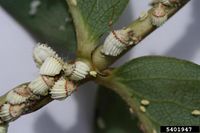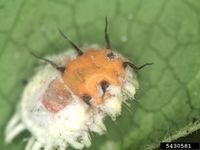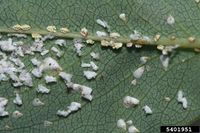Difference between revisions of "Icerya purchasi"
| Line 4: | Line 4: | ||
<font color="#800000">'''''Icerya purchasi'''''</font> Maskell, 1879 - (Australian fluted scale) | <font color="#800000">'''''Icerya purchasi'''''</font> Maskell, 1879 - (Australian fluted scale) | ||
| − | The scale attacks citrus and other plants. It is native to Australia but has spread to North America (first record in California in 1869) and Europe at the end of the 19th century. Apart from direct damage the excreted honey dew causes the formation of sooty mold which makes fruits unmarketable and blocks sunlight. The female is parthenogenetic and the large ovisac contains around 1,000 eggs. The hatching crawlers disperse through the air. | + | The scale attacks citrus and various other plants. It is native to Australia but has spread to North America (first record in California in 1869) and Europe at the end of the 19th century. Apart from direct damage, the excreted honey dew causes the formation of sooty mold which makes fruits unmarketable and blocks sunlight. The female is parthenogenetic and the large ovisac contains around 1,000 eggs. The hatching crawlers disperse through the air. |
| − | Mature females are bright orange-red, yellow, or brown and are covered with white or yellowish wax. The fluted ovisac is often twice as long as the body and contains red eggs. The ovisac raises the scale insect which appears to | + | Mature females are bright orange-red, yellow, or brown and are covered with white or yellowish wax. The fluted ovisac is often twice as long as the body and contains red eggs. The ovisac raises the scale insect which appears to be standing on its head. The young nymphs are also red with dark antennae and brown legs. |
{{VN | {{VN | ||
|en=Australian fluted scale<br/>cottony cushion scale | |en=Australian fluted scale<br/>cottony cushion scale | ||
Latest revision as of 11:24, 18 July 2016
| Literature database |
|---|
| 46 articles sorted by: |
| • year (recent ones first) |
| • research topics |
| • countries/regions |
| • host plants |
| • list of natural enemies |
Icerya purchasi Maskell, 1879 - (Australian fluted scale)
The scale attacks citrus and various other plants. It is native to Australia but has spread to North America (first record in California in 1869) and Europe at the end of the 19th century. Apart from direct damage, the excreted honey dew causes the formation of sooty mold which makes fruits unmarketable and blocks sunlight. The female is parthenogenetic and the large ovisac contains around 1,000 eggs. The hatching crawlers disperse through the air.
Mature females are bright orange-red, yellow, or brown and are covered with white or yellowish wax. The fluted ovisac is often twice as long as the body and contains red eggs. The ovisac raises the scale insect which appears to be standing on its head. The young nymphs are also red with dark antennae and brown legs.
| Vernacular names | |
|---|---|
| • Deutsch: | Australische Wollschildlaus |
| • English: | Australian fluted scale cottony cushion scale |
| • Español: | cochinilla acanalada |
| • Français: | cochenille australienne |
| • Português: | cochonilha-australiana |
For details see the respective page in Wikipedia.
- Other images of Icerya purchasi (IPM Images - click to enlarge)


